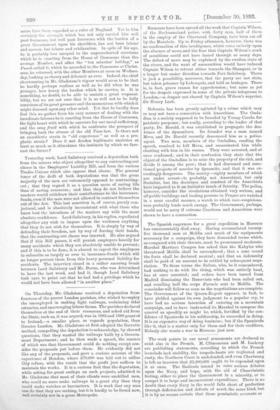Yesterday week, Lord Salisbury received a deputation both from the
miners who object altogether to any contracting-out clause in the Employers' Liability Bill, and from the various Trades-Unions which also oppose that clause. The general tenor of the drift of both deputations was that the great majority of the men are vehemently opposed to contracting- out ; that they regard it as a question more of saving life than of saving resources ; and that they do not believe the masters would withdraw their contributions to the insurance- funds, even if the men were not allowed to contract themselves out of the Act. This last assertion is, of course, purely con- jectural, and is absolutely inconsistent with what those who know best the intentions of the masters say with the most absolute confidence. Lord Salisbury, in his replies, repudiated altogether any wish to impose upon the workmen anything that they do not wish for themselves. It is simply by way of defending their freedom, net by way of forcing their hands, that the contracting-out clause was inserted. He also argued that if this Bill passes, it will punish employers heavily for many accidents which they are absolutely unable to prevent; and if this is to be done, it is absurd to expect the employers to subscribe as largely as ever to insurance-funds which will no longer protect them from this heavy personal liability for accidents. The interview closed in a rather amusing brush between Lord Salisbury and Mr. Burns, who was determined to have the last word, and had it, though Lord Salisbury took care to point out that he had had a privilege which he would not have been allowed "in another place."


































 Previous page
Previous page